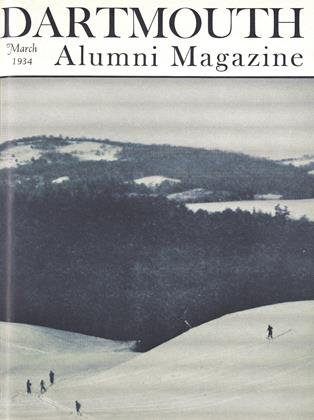More than 50 Dartmouth men from a wide area of "upstate" New York gathered at the Onondaga Hotel in Syracuse on Wednesday night, January 31, to greet Dean Laycock on his first visit to Central New York Dartmouth Club. The turnout, about double the previous maximum, proved the affection which Dartmouth men of all classes have for the dean, and his talk proved well worth the trip which many of those present made in the tail-end of a three-day storm which was a reminder of Hanover at its snowiest.
Describing the growth of the College in the 41 years with which he has been connected with it, Dean Laycock called the ten years from 1920 to 1930 the "golden decade" in Dartmouth history. In this decade the College experienced a marvelous development, he said, the selective process was invented (to be copied through-out the country), the quality of the faculty improved, and general scholastic standards increased.
There has been no depression in the student body, Dean Laycock told the club. The enrollment now is 2,300, he reported, and he expressed the opinion that with the construction of the proposed social center the college plant would be adequate for a student body of 2,500. He received no immediate offers, however, when he explained that the plans were in readiness for the social center and that all that .was needed was five million dollars for building and endowing the structure.
When the dean announced that he was leady to answer questions from anyone present, the first topic brought up, of course, was the new football coaching staff. His answer was to the effect that, "It couldn't be better." He was unstinting in his praise of Head Coach Red Blaik and his two assistants, Ellinger of West Point and Gustafson of Pittsburgh, and also spoke highly of the attitude taken by Jack Cannell in resigning voluntarily.
Prof. Perley O. Place '93, a member of he faculty of Syracuse University, also was called upon for a short talk by President Hugh A. Johnson. He spoke in tribute of Dean Laycock and his long service for the College.
The business session, consisting chiefly of election of a new slate of officers and announcement of the next meeting, March 12, was conducted between courses of the dinner. The speaker at the March meeting will be Rev. Dr. Ray Freeman Jenney of Park Central Presbyterian church, Syracuse, who will tell and show pictures of a trip to Russia he made last summer. Dr. Jenney attended Dartmouth one fall long enough to suffer a broken collar bone in a football scrimmage. When he recovered he enrolled in a Mid-Western college, but he declares this was not due to pique for his rough handling and he is more than willing to be considered a Dartmouth man.
Stuart Edgerly '25, of Syracuse was elected president of the club to succeed Johnson, a member of the class of '30; James G. Capps Jr. '19, of Utica, was named vicepresident, and Paul Howe '14 was reelected secretary and treasurer, offices which he has been forced to fill, whether elected to them or not, about as long as the club has been functioning.
The executive committee Is made up of the officers and the following members: Warren C. Billings '07, of Rome; R. E. Chesley 'OB, of Utica; Carl C. Forsaith '13, of Syracuse; Alfred M. Green '2l, of Syracuse; Hugh A. Johnson '30, of Binghamton; James W. Lower '27, of Auburn; William G. Morton '28, of Fulton; Robert Pierce '25, of Utica; William W. Short '24, of Syracuse; David W. Trainer '21, of Hamilton; and P. H. Winchester '99, of Syracuse.
 View Full Issue
View Full Issue
More From This Issue
-
 Class Notes
Class NotesClass of 1910
March 1934 By Harold P. Hinman -
 Class Notes
Class NotesClass of 1933
March 1934 By John S. Monagan -
 Class Notes
Class NotesClass of 1908
March 1934 By Laurence W. Griswold -
 Article
ArticleHANOVER BROWSING
March 1934 By Rees H. Bowen -
 Class Notes
Class NotesClass of 1930
March 1934 By Albert I. Dickerson -
 Article
ArticleTRIBUTES TO PROFESSOR LINGLEY
March 1934 By Friends and Associates
Class Notes
-
 Class Notes
Class NotesASSOCIATIONS OF SECRETARIES
February, 1923 -
 Class Notes
Class Notes1923
March 1962 By CHESLEY T. BIXBY, DR. THEODORE R. MINER, TRUMAN T. METZEL -
 Class Notes
Class NotesBaltimore
February 1945 By Harold R.Hastings '00. -
 Class Notes
Class NotesClass of 1904
May 1929 By Harry B. Johnson -
 Class Notes
Class Notes1932
FEBRUARY 1964 By JILDO E. CAPPIO, ROBERT E. FENDRICH -
 Class Notes
Class NotesCLASS OF 1881
October, 1908 By Myron W. Adams

